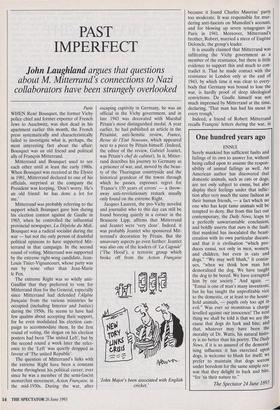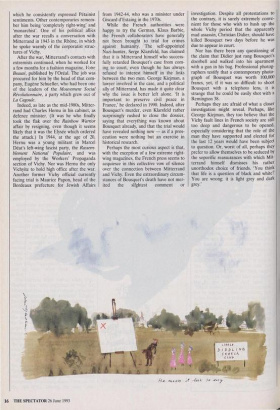PAST IMPERFECT
John Laughland argues that questions
about M. Mitterrand's connections to Nazi collaborators have been strangely overlooked
Paris WHEN Rene Bousquet, the former Vichy police chief and former exporter of French Jews to Auschwitz, was shot dead in his apartment earlier this month, the French press systematically and characteristically failed to investigate what is, perhaps, the most interesting fact about the affair: Bousquet was an old friend and political ally of Francois Mitterrand.
Mitterrand and Bousquet used to see each other until at least the early 1980s. When Bousquet was received at the Elysee in 1981, Mitterrand declared to one of his officials, surprised at the company the President was keeping, 'Don't worry. He's an old friend: he has done a lot for me.'
Mitterrand was probably referring to the support which Bousquet gave him during his election contest against de Gaulle in 1965, when he controlled the influential provincial newspaper, La Depeche du Midi. Bousquet was a radical socialist during the war — but not the only person of doubtful political opinions to have supported Mit- terrand in that campaign. In the second round of voting, Mitterrand was supported by the extreme right-wing candidate, Jean- Louis Tixier-Vignancourt, whose party was run by none other than Jean-Marie le Pen.
The extreme Right was so wildly anti- Gaullist that they preferred to vote for Mitterrand than for the General, especially since Mitterrand had defended l'Algerie francaise from the various ministries he occupied (including Interior and Justice) during the 1950s. He seems to have had few qualms about accepting their support, for he even modulated his election cam- paign to accommodate them. In the first round of voting, the slogan on his election posters had been 'The united Left', but by the second round a week later the refer- ence to the 'Left' was quietly dropped in favour of 'The united Republic'.
The question of Mitterrand's links with the extreme Right have been a constant theme throughout his political career, ever since he was a member of the semi-fascist monarchist movement, Action Francaise, in the mid-1930s. During the war, after escaping captivity in Germany, he was an official in the Vichy government, and in late 1943 was decorated with Marshal Petain's most distinguished medal. A year earlier, he had published an article in the Petainist, anti-Semitic review, France, Revue de l'Etat Nouveau, which appeared next to a piece by Petain himself. (Indeed, the editor of the review, Gabriel Jeantet, was Petain's chef de cabinet). In it, Mitter- rand describes his journey to Germany as a prisoner of war, and, moved by the beau- ty of the Thuringian countryside and the historical grandeur of the towns through which he passes, expresses regret for `France's 150 years of errors' — a throw- away anti-revolutionary remark usually only found on the extreme Right.
Jacques Laurent, the pro-Vichy novelist and journalist who to this day can still be found boozing quietly in a corner in the Brasserie Lipp, affirms that Mitterrand and Jeantet were 'very close'. Indeed, it was probably Jeantet who sponsored Mit- terrand's decoration by Petain. But the unsavoury aspects go even further: Jeantet was also one of the leaders of 'La Cagoule' (`The Hood'), a terrorist group which broke off from the Action Francaise `John Major's been associated with English cricket.' because it found Charles Maurras' party too moderate. It was responsible for mur- dering anti-fascists on Mussolini's account, and for blowing up seven synagogues in Paris in 1941. Moreover, Mitterrand's brother, Robert, married a niece of Eugene Deloncle, the group's leader.
It is usually claimed that Mitterrand was infiltrating the Vichy government as a member of the resistance, but there is little evidence to support this and much to con- tradict it. That he made contact with the resistance in London only at the end of 1943, by which time it was clear to every- body that Germany was bound to lose the war, is hardly proof of deep ideological convictions. De Gaulle himself was not much impressed by Mitterrand at the time, declaring, 'That man has had his snout in every trough.' Indeed, a friend of Robert Mitterrand recalls Francois' letters during the war, in which he consistently expressed Petainist sentiments. Other contemporaries remem- ber him being `completely right-wing' and `monarchist'. One of his political allies after the war recalls a conversation with Mitterrand in 1943 in the Rhone, in which he spoke warmly of the corporatist struc- tures of Vichy.
After the war, Mitterrand's contacts with extremists continued, when he worked for a few months for a fashion magazine, Notre Beaune, published by l'Oreal. The job was procured for him by the head of that com- pany, Eugene Schueller, who had been one of the leaders of the Mouvement Social Revolutionnaire, a party which grew out of La Cagoule.
Indeed, as late as the mid-1980s, Mitter- rand had Charles Hernu in his cabinet, as defence minister. (It was he who finally took the flak over the Rainbow Warrior affair by resigning, even though it seems likely that it was the Elysee which ordered the attack.) In 1944, at the age of 20, Hernu was a young militant in Marcel Dees left-wing fascist party, the Rassem- blement National Populaire, and was employed by the Workers' Propaganda section of Vichy. Nor was Hernu the only Vichyite to hold high office after the war. Another former Vichy official currently facing trial is Maurice Papon, head of the Bordeaux prefecture for Jewish Affairs
from 1942-44, who was a minister under Giscard d'Estaing in the 1970s.
While the French authorities were happy to try the German, Klaus Barbie, the French collaborators have generally not been brought to trial for crimes against humanity. The self-appointed Nazi-hunter, Serge Klarsfeld, has claimed that it is Mitterrand himself who success- fully retarded Bousquet's case from com- ing to court, even though he has always refused to interest himself in the links between the two men. George Kiejman, a lawyer involved in the case, and a political ally of Mitterrand, has made it quite clear why the issue is better left alone. `It is important to preserve civil peace in France,' he declared in 1990. Indeed, after Bousquet's murder, even Klarsfeld rather surprisingly rushed to close the dossier, saying that everything was known about Bousquet already, and that the trial would have revealed nothing new — as if a pros- ecution were nothing but an exercise in historical research.
Perhaps the most curious aspect is that, with the exception of a few extreme right- wing magazines, the French press seems to acquiesce in this collective vow of silence over the connection between Mitterrand and Vichy. Even the extraordinary circum- stances of Bousquet's death have not mer- ited the slfghtest comment or investigation. Despite all protestations to the contrary, it is surely extremely conve- nient for those who wish to hush up the whole Vichy period that the apparently mad assassin, Christian Didier, should have killed Bousquet two days before he was due to appear in court.
Nor has there been any questioning of the claim that Didier just rang Bousquet's doorbell and walked into his apartment with a gun in his bag. Professional photog- raphers testify that a contemporary photo- graph of Bousquet was worth 100,000 francs, yet, if it was so difficult to shoot Bousquet with a telephoto lens, it is strange that he could be easily shot with a Remington 38.
Perhaps they are afraid of what a closer investigation might reveal. Perhaps, like George Kiejman, they too believe that the Vichy fault lines in French society are still too deep and dangerous to be opened, especially considering that the role of the man they have supported and elected for the last 12 years would have been subject to question. Or, worst of all, perhaps they prefer to allow themselves to be seduced by the soporific reassurances with which Mit- terrand himself dismisses his rather unorthodox choice of friends. 'You think that life is a question of black and white? You are wrong: it is light grey and dark grey.'



























































 Previous page
Previous page